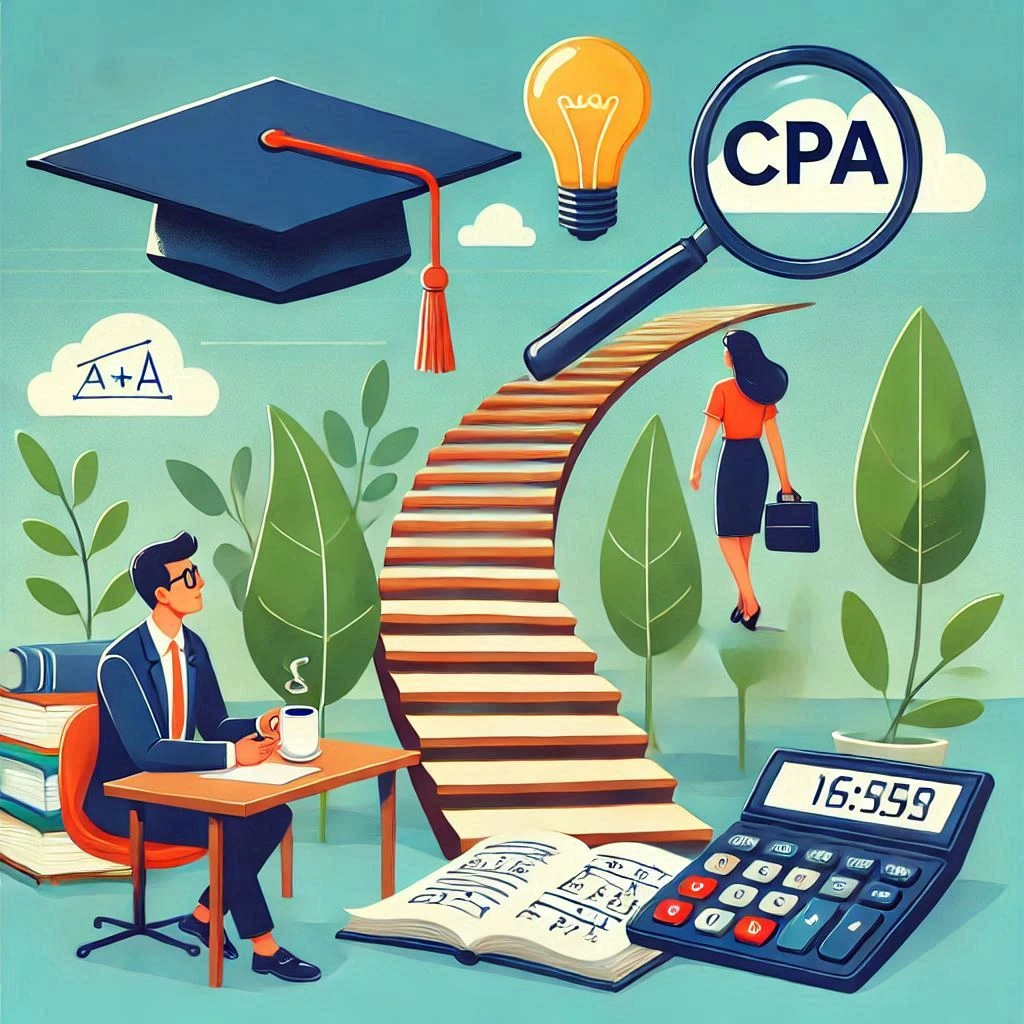Introduction
The designation of Certified Public Accountant (CPA) stands as a hallmark of professionalism and expertise. A CPA is not just a credential; it signifies a commitment to high standards of ethics, knowledge, and practice in accounting and finance. This certification is particularly vital for those pursuing careers in internal auditing, where the ability to assess financial operations and ensure compliance with regulations is paramount.
The CPA certification opens doors to a myriad of career opportunities, enhancing credibility and potentially leading to higher earning potential. However, a common misconception persists: that an accounting degree is an absolute prerequisite for obtaining CPA certification. This belief can deter many aspiring finance professionals, particularly those from non-accounting backgrounds, from pursuing their CPA aspirations.
In this blog section, we will unpack the alternative pathways to CPA certification, exploring how individuals without an accounting degree can still achieve this prestigious credential. By examining the requirements, potential routes, and the value of CPA certification in the internal audit field, we aim to provide clarity and encouragement for those considering this career path. Whether you are an aspiring internal auditor or a finance professional looking to enhance your qualifications, understanding these alternative routes can empower you to navigate your journey toward becoming a CPA.
Understanding CPA Requirements
Becoming a Certified Public Accountant (CPA) is a significant milestone for finance professionals, particularly those aspiring to specialize in internal audit. However, many potential candidates wonder if it is possible to achieve CPA certification without a traditional accounting degree. This section aims to clarify the general requirements for obtaining a CPA license, including educational prerequisites, examination criteria, and state-specific regulations.
Overview of CPA Requirements Across Different States
The requirements for CPA certification can vary significantly from state to state in the U.S. Each state has its own Board of Accountancy that sets specific criteria for licensure. Generally, the core requirements include:
- Educational Background: Most states require candidates to have at least a bachelor’s degree, but the field of study can differ. While an accounting degree is the most straightforward path, many states allow degrees in related fields such as finance, business administration, or economics, provided that candidates complete specific accounting coursework.
- Credit Hours: Typically, candidates must complete 150 semester hours of college education, which is more than the standard 120 hours required for a bachelor’s degree. This often necessitates additional coursework or a master’s degree, especially for those without an accounting background[1][2].
- Experience: Many states require candidates to gain relevant work experience under the supervision of a licensed CPA. This experience can often be obtained in various finance-related roles, including internal audit, which can be beneficial for those without a formal accounting degree[3].
Educational Requirements
The educational requirements for CPA candidates are crucial, especially for those without an accounting degree. Here are the key components:
- Degree Types: While a bachelor’s degree is essential, it does not have to be in accounting. Candidates with degrees in business, finance, or other related fields can qualify, provided they meet the additional coursework requirements[4].
- Credit Hours: Candidates must complete a minimum of 150 credit hours, which typically includes:
- Accounting Courses: Most states require a specific number of accounting courses, such as financial accounting, auditing, taxation, and managerial accounting. Candidates without an accounting degree may need to take additional courses to fulfill these requirements[5].
- Business Courses: In addition to accounting courses, candidates are often required to complete business-related courses, which may include finance, business law, and economics[6].
Examination Requirements
Passing the CPA exam is a critical step in the certification process. The exam consists of four sections, each focusing on different areas of accounting and finance:
- Auditing and Attestation (AUD): This section tests knowledge of auditing procedures, generally accepted auditing standards, and the skills necessary to perform audits.
- Business Environment and Concepts (BEC): This section covers business concepts, including corporate governance, economic concepts, and financial management.
- Financial Accounting and Reporting (FAR): This section assesses knowledge of financial accounting and reporting frameworks, including U.S. GAAP and IFRS.
- Regulation (REG): This section focuses on federal taxation, ethics, and business law.
To pass the CPA exam, candidates must achieve a minimum score of 75 on each section, and they must complete all four sections within an 18-month period[7]. The exam is known for its rigor, and candidates often benefit from structured study programs or review courses to prepare effectively.
Alternative Pathways to CPA Certification
The journey to becoming a Certified Public Accountant (CPA) is often perceived as a linear path requiring a degree in accounting. However, for aspiring internal auditors and finance professionals without an accounting degree, alternative routes exist that can lead to CPA certification. This section explores these pathways, emphasizing how individuals can leverage their existing qualifications and experiences to achieve their CPA goals.
Leveraging Non-Accounting Degrees
Many individuals hold degrees in fields such as finance, business administration, or economics, which can serve as a strong foundation for pursuing CPA certification. While these degrees do not cover all the accounting principles required for the CPA exam, they often include relevant coursework that can be beneficial. For instance, finance degrees typically encompass financial management, investment analysis, and risk assessment, all of which are integral to accounting practices.
In many jurisdictions, candidates with non-accounting degrees can still qualify for the CPA exam by demonstrating their knowledge through additional coursework. This flexibility allows individuals to build on their existing education while fulfilling the necessary accounting prerequisites. For example, a finance graduate may only need to complete a few accounting courses to meet the educational requirements set by their state board of accountancy[1].
Additional Coursework in Accounting
To bridge the gap between a non-accounting degree and CPA certification, aspiring CPAs can enroll in accounting courses at community colleges, universities, or through online programs. These courses typically cover essential topics such as financial accounting, managerial accounting, taxation, and auditing. Completing these courses not only fulfills state educational requirements but also equips candidates with the knowledge needed to succeed on the CPA exam.
Many states require candidates to have a total of 150 credit hours of education, which can include a combination of undergraduate and graduate coursework. Therefore, individuals may consider pursuing a master’s degree in accounting or an MBA with a concentration in accounting to meet this requirement while enhancing their qualifications[2].
Importance of Experience in Accounting-Related Roles
In addition to educational qualifications, practical experience plays a crucial role in the CPA certification process. Many states require candidates to have a certain amount of work experience in accounting or a related field before they can obtain their CPA license. This experience can be gained through various roles, such as internal auditor, financial analyst, or tax preparer.
For those without an accounting degree, gaining relevant experience can be a strategic way to demonstrate their capabilities and commitment to the field. Entry-level positions in finance or accounting departments can provide valuable exposure to accounting practices and principles, making candidates more competitive when applying for CPA certification. Furthermore, internships or volunteer opportunities in accounting-related roles can also help aspiring CPAs build their resumes and gain the necessary experience[3].
Credit Transfer and Additional Coursework
There are several pathways available to bridge the gap in accounting knowledge and fulfill the necessary credit requirements for CPA certification. This section explores how additional coursework, particularly through community colleges and online programs, can facilitate this journey.
Obtaining Necessary Accounting Credits
One of the most effective ways to accumulate the required accounting credits is through community colleges or accredited online courses. Many community colleges offer foundational accounting courses that cover essential topics such as financial accounting, managerial accounting, taxation, and auditing. These courses are often more accessible and affordable than traditional four-year institutions, making them an attractive option for those looking to pivot into accounting from other fields.
Online courses have also gained popularity, providing flexibility for working professionals. Numerous accredited institutions offer online programs that allow students to complete coursework at their own pace. This flexibility is particularly beneficial for aspiring CPAs who may be balancing work commitments or other responsibilities while pursuing their certification.
Importance of Choosing Accredited Programs
When selecting courses, it is crucial to choose accredited programs to ensure that the credits earned will be transferable to a CPA licensure program. Accreditation signifies that the institution meets specific educational standards, which is essential for the recognition of credits by state boards of accountancy. Students should verify that the courses they are considering are recognized by the CPA licensing authority in their state, as requirements can vary significantly across jurisdictions.
Additionally, many states require a minimum number of accounting credits from an accredited institution to qualify for the CPA exam. Therefore, aspiring CPAs should conduct thorough research and consult with academic advisors to ensure that their chosen courses align with the requirements set forth by their state’s board of accountancy.
Consideration of CPA Review Courses and Certification Programs
In addition to traditional coursework, aspiring CPAs may also consider enrolling in CPA review courses and certification programs. These programs are designed to prepare candidates for the CPA exam and often include comprehensive study materials, practice exams, and expert instruction. While these courses do not typically provide college credits, they can be invaluable in reinforcing accounting concepts and exam strategies.
Some certification programs may also offer a pathway to earn credits while preparing for the CPA exam. For instance, programs that focus on specific areas of accounting or finance can provide both knowledge and credits that contribute toward the total required for CPA licensure.
Gaining Relevant Experience
Practical experience can play a crucial role in compensating for this educational gap. This section explores how relevant work experience can bolster your CPA candidacy, the types of roles that provide valuable experience, and effective networking strategies to secure internships or entry-level positions in accounting or finance.
The Role of Practical Experience
While a degree in accounting is traditionally viewed as a prerequisite for CPA certification, many state boards of accountancy allow candidates to substitute relevant work experience for formal education. This flexibility acknowledges that practical skills and knowledge gained through hands-on experience can be just as valuable as academic credentials. For instance, candidates may be able to meet the experience requirements by working in roles that involve financial analysis, auditing, or tax preparation, even if these positions are not strictly labeled as “accounting” roles[1][2].
Types of Roles and Industries
Several roles and industries can provide the necessary experience for CPA candidates. Here are some key areas to consider:
- Internal Audit: Working in internal audit departments allows candidates to gain insights into financial controls, risk management, and compliance, all of which are critical for CPA roles. This experience is particularly relevant for those aiming to specialize in auditing or financial reporting[3].
- Financial Analysis: Positions in financial analysis, such as financial analyst or budget analyst, involve evaluating financial data and preparing reports, which can help develop the analytical skills needed for CPA certification[4].
- Tax Preparation: Gaining experience in tax preparation, whether through internships at tax firms or entry-level positions, can provide a solid foundation in tax regulations and compliance, essential knowledge for CPAs[5].
- Accounting Support Roles: Entry-level positions such as accounts payable/receivable clerks or bookkeeping assistants can offer exposure to accounting processes and software, helping candidates build a practical understanding of financial operations[6].
Networking Tips for Securing Opportunities
Networking is a vital component of finding internships or entry-level positions in accounting or finance. Here are some effective strategies:
- Join Professional Organizations: Becoming a member of organizations such as the American Institute of CPAs (AICPA) or local accounting societies can provide access to networking events, workshops, and job boards specifically tailored for aspiring CPAs[7].
- Attend Industry Events: Participating in finance and accounting conferences, seminars, and workshops can help you meet professionals in the field. These events often feature networking sessions where you can connect with potential employers or mentors[8].
- Leverage Social Media: Platforms like LinkedIn are invaluable for building professional connections. Engage with industry groups, share relevant content, and reach out to professionals for informational interviews to learn more about their career paths and potential job openings[9].
- Utilize University Resources: If you are currently enrolled in a college or university, take advantage of career services, job fairs, and alumni networks. Many institutions have dedicated resources to help students and recent graduates find internships and entry-level positions in accounting and finance[10].
Taking the CPA Exam
Alternative pathways exist that allow individuals to pursue CPA certification, opening doors to a rewarding career in accounting and finance. This section will guide you through the essential steps to register for the CPA exam, effective study strategies, and the timeline for completing the exam and obtaining licensure.
Steps to Register for the CPA Exam
- Eligibility Verification: Before you can register for the CPA exam, it’s crucial to verify your eligibility. Each state has its own requirements, but generally, candidates must have a minimum number of college credits, often including specific coursework in accounting and business. For those without an accounting degree, it may be necessary to complete additional coursework to meet these requirements. Many states allow candidates to substitute relevant work experience or other degrees for traditional accounting education[1][2].
- Choose Your State Board: Once you confirm your eligibility, you need to select the state board of accountancy where you will apply. Each state has its own application process, fees, and deadlines, so it’s important to familiarize yourself with the specific requirements of your chosen state[3].
- Submit Your Application: After selecting your state board, you will need to submit an application for the CPA exam. This typically includes providing proof of your educational background, work experience, and any other documentation required by the state board. Be prepared to pay an application fee, which varies by state[4].
- Receive Authorization to Test (ATT): Upon approval of your application, you will receive an Authorization to Test (ATT). This document allows you to schedule your CPA exam sections. The CPA exam consists of four sections: Auditing and Attestation (AUD), Business Environment and Concepts (BEC), Financial Accounting and Reporting (FAR), and Regulation (REG)[5].
Study Strategies and Resources for Exam Preparation
Preparing for the CPA exam requires a strategic approach, especially for those who may not have a traditional accounting background. Here are some effective study strategies:
- Create a Study Plan: Develop a structured study schedule that allocates time for each exam section. Aim to cover all topics thoroughly, allowing for review periods before the exam dates. A typical study plan spans several months, depending on your familiarity with the material[6].
- Utilize CPA Review Courses: Consider enrolling in a CPA review course, which can provide comprehensive study materials, practice exams, and expert guidance. Many courses are available online, offering flexibility for working professionals. Popular options include Becker, Wiley, and Roger CPA Review[7].
- Practice with Sample Questions: Familiarize yourself with the exam format by practicing with sample questions and past exam papers. This will help you understand the types of questions you may encounter and improve your time management skills during the actual exam[8].
- Join Study Groups: Collaborating with peers can enhance your understanding of complex topics. Study groups provide motivation, accountability, and the opportunity to discuss challenging concepts with others preparing for the exam[9].
Timeline for Completing the CPA Exam and Obtaining Licensure
The timeline for completing the CPA exam and obtaining licensure can vary based on individual circumstances, but here’s a general outline:
- Preparation Phase (3-6 months): After receiving your ATT, allocate 3 to 6 months for studying, depending on your familiarity with the material and your study schedule. This phase includes taking review courses, practicing questions, and revising key concepts[10].
- Exam Completion (1-2 months): You can take the CPA exam sections in any order, but it’s advisable to complete them within an 18-month window after passing your first section. Plan to take one or two sections at a time, allowing for adequate preparation between exams[11].
- Licensure Application (1-3 months): After passing all four sections, you will need to apply for licensure through your state board. This process can take 1 to 3 months, depending on the state’s processing times and any additional requirements, such as work experience verification[12].
- Continuing Education: Once licensed, CPAs must complete continuing professional education (CPE) to maintain their certification. This requirement varies by state but typically involves completing a certain number of hours of education every year[13].
Conclusion
In conclusion, aspiring internal auditors and finance professionals should take heart in knowing that an accounting degree is not the sole pathway to CPA certification. The journey to becoming a Certified Public Accountant (CPA) can be navigated through various alternative routes, including relevant work experience, targeted educational programs, and specialized training that align with the CPA exam requirements.
Many states allow candidates to substitute non-accounting degrees with specific coursework in accounting and business-related subjects, enabling individuals from diverse educational backgrounds to qualify for the CPA exam. This flexibility opens doors for those who may have pursued degrees in finance, business administration, or even fields outside of traditional accounting, such as economics or mathematics.
Moreover, gaining practical experience in internal audit or related finance roles can significantly bolster your qualifications. Engaging in internships, entry-level positions, or even volunteer opportunities can provide the necessary exposure and skills that not only prepare you for the CPA exam but also enhance your overall professional profile.
As you consider your path toward CPA certification, take the time to explore these alternative educational and experiential pathways. Research the specific requirements in your state, seek out mentorship from current CPAs, and connect with professional organizations that can provide guidance and resources.
Find out more about Shaun Stoltz https://www.shaunstoltz.com/about/
This post was written by an AI and reviewed/edited by a human.



